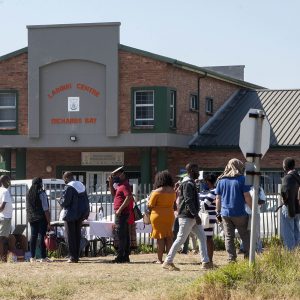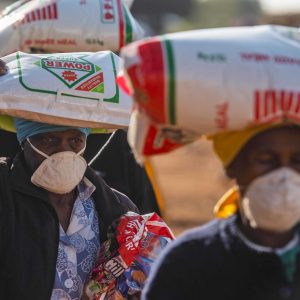Luxury game reserves leave workers in the lurch
In this third instalment in a series on the coronavirus and capitalism, New Frame looks at the effects of retrenchments on workers in a high-end tourist region of the Eastern Cape.
Author:
19 August 2020

Many black residents of Paterson, a small settlement in a deep rural part of the Eastern Cape, rely on low-paid casual work on citrus farms, luxury private game reserves and hunting lodges. A tough and precarious existence at the best of times, their income has deteriorated significantly since the coronavirus pandemic broke out and a lockdown was subsequently implemented.
Located down a single tar road off the N10 to Cradock and described as an “almost forgotten” town by the tourist website Route 62, Paterson consists of only one takeaway outlet, a general supermarket, an ATM and six giant grain silos. The only modern building is a large and shiny new police station. There’s a township with unattractive schools and mainly gravel roads in which almost 10 000 people live without modern amenities. The town still bears the name of a 19th-century coloniser, John Paterson, and the Dutch Reformed Church looms large at the entrance to the township.
Part One:
It costs an unaffordable R180 for a return trip in a crowded taxi to the nearest city, Port Elizabeth, 75km away. Visits to the South African Social Security Agency office to sort out problems with grants or to the Department of Labour to query delayed Unemployment Insurance Fund (UIF) payments are a financial headache and also require stamina – Paterson’s township residents must leave home at 1am to reach Port Elizabeth by 2am so that they can get a place in the queue. The department used to send officials to the town once a month, but their visits have stopped during the lockdown.
Although the town is surrounded by what Route 62 describes as eight of the “most renowned and luxurious private game reserves in the Eastern Cape”, none of this wealth is evident in Paterson, which has been hit by waves of retrenchments and lay-offs since the lockdown began.
Themba Molaba* used to work at the upmarket Shamwari Private Game Reserve, which is set on 7 000ha of land and has been in existence for 30 years. Home to lions, leopards, elephants, rhinos and buffaloes, Shamwari charges guests up to R10 000 a night for a room in one of its luxury lodges. Molaba is one of about 40 Shamwari workers who have been retrenched during the lockdown.
‘Nobody is working’
Speaking to New Frame outside the Paterson paralegal office, he starts to weep as he talks about the loss of his job. “I feel so bad right now. I have a house, a wife and two children. They depend on me. Nobody is working. I really don’t think I will ever get another job because I am already 52 years old. Jobs are so scarce.”
Vusi September*, 39, is another of Shamwari’s retrenched workers. He did not want his name used because after five years of service as a gardener, September is hoping that Shamwari will re-employ him once the lockdown ends.
“I don’t know what is going to happen to my family in 2020 because I’ve got a lot of accounts. I’m just waiting for Shamwari to call me back because they said after the coronavirus, they are going to hire more people again. I’m young and my family is young, but I’ve got no job in South Africa now. I am not feeling all right but nobody is to blame for the coronavirus,” he said.
September and Molaba were at home and received Covid-19 UIF temporary relief scheme payments for three months before being retrenched, with only the first two months topped up by Shamwari. They fear that because they have been retrenched, they will no longer be eligible for any relief payments.
Part Two:
In a letter to staff dated 29 June, Shamwari said it was already running at a R75.5 million loss and had terminated the employment of all its fixed-term contract staff at the end of May. It had lost the majority of its clients, who are mostly from overseas. “All the analysis done by Shamwari indicates that during the first 12 months after it is permitted to operate as ‘normal’… a total business level of approximately 15% is to be expected,” the letter said.
Shamwari hospitality manager Theo Cromhout told New Frame that the reserve did not anticipate guest numbers returning to pre-lockdown levels for at least four years.
“We are exceptionally aware of the circumstances in the surrounding communities, where most of our team live. The decision to retrench some people was one that we put off as long as we possibly could. It is, however, something we can no longer avoid without risking the entire enterprise, the livelihoods of the whole workforce and continuing the community programmes that we provide,” Cromhout said.
Precarious existence
There are many precarious workers in Paterson, those whose work is seasonal or casual and who have no contracts. They have fared worse during the lockdown because there is no severance pay or UIF for them.

Thembi Dlamini*, Sylvia Petersen* and Refiloe Davids* are all general workers at Schotia Safaris, another private game reserve in the area. They have been employed as casual workers for between eight and 24 years. They work 10-hour days, 11 days per fortnight, with three days off. They have no contracts and say they know their employer has never paid contributions to the UIF.
“Even before the lockdown, we had no contracts. We knew Schotia was not paying our UIF and when we told them to pay it, our boss would mock us and say, ‘What is UIF?’ Some of us don’t even mention these things because the boss tells us that we are too clever and we must go home,” said Davids.
“We do not have UIF, we have nothing,” said Dlamini. “We do not have contracts. He [their employer] does not care for us. This behaviour is too painful to us because we are hungry, sitting in the township. We worked hard there for many years and we are working under a dangerous situation. We walk in the veld and work with lions, which makes us very unhappy. There’s a lot of promises the boss has made to me, but there is not a single one he ever [fulfils]. He does not know at this moment even what I am eating.”
Since March this year, they have received only one Covid-19 temporary relief payment from the UIF and do not know with certainty whether they have been retrenched or not. “We’ve got children at home and no food. We are helping each other with R50 here and there and that is how we survive,” said Petersen.
Schotia Safaris responded with a short text message saying only, “They have received two months payments so far. We have applied for their next month.”

‘Rationing’ UIF payments
Gloria Mahashi, 50, only found out how precarious her job was when her employer, Tootabi Hunting Safaris, recently told her to return her housekeeper’s uniform or she would not get UIF relief payments. Mahashi was also never formally retrenched. “There is no communication from the boss to say how long I will be off for. I don’t know when I will be going back,” she said.
Mahashi said her employer has not paid her UIF relief money in full and her payments have also been late. In a letter to her representative, Simphiwe Dada of the Sundays River Valley Farm Workers’ Forum, Tootabi international relations manager Loodt Büchner said that because workers generally do not earn more than R2 500 a month, he had decided to “ration” the Covid-19 UIF temporary relief scheme money.
“We have thought it best to disperse of these funds in a timely manner over the period to come until it has ran out of its reserves [sic],” said Büchner. He said to tide workers over, Tootabi had given each worker R400 in cash as well as a R1 200 food parcel. However, he then said the food parcel was actually a “loan” and Tootabi would be recouping R1 200 from each worker’s Covid-19 temporary relief scheme payments.
Related article:
Dada said this was unlawful and Tootabi would be reported to labour inspectors unless it apologised to workers and paid over all the UIF relief money it had received. “This is an attempt to defraud workers of the little money they receive from the state. More disappointing is an attempt by the company to legitimise what appears to be an illegitimate act,” said Dada. He added that the R400 payment had actually been the tips owed to the workers, and no worker had been told that the food parcel was a loan. The forum had also calculated the cost of the R1 200 parcel to be just R539.
Büchner would not comment. He instead referred New Frame to another member of staff, who did not respond to questions.
Replacing people with animals
Tuse Manene, a paralegal who runs the Paterson legal advice office as a volunteer, says people have been coming to him with the same problems since the 1980s.

“This place has a bad history. We were forcibly removed from our nearby farms during apartheid and dumped in this township. When the white farmers got the land, most of them started game farms. The white farmers left our people destitute to bring these Big Five animals here,” Manene said.
Before the lockdown, thousands of Paterson’s residents were unemployed but supported by family members who did have work. With employers in the area restructuring, downsizing and retrenching workers, and with no other job opportunities on the horizon, the future for the people of Paterson looks bleak. Some of the laid-off workers have been forced back into hunter-gatherer mode, walking several kilometres every day to collect wood and sticks that they sell in small bundles in the township.
(isiXhosa translations by Luthando Sibango)
*Names have been changed.



